Natives of Pahalgam, allege that the Master Plan for development and environmental conservation has ignored their right to basic needs while laying out rules. They have approached the High Court accusing that the same rules have been flouted under the garb of creating tourist infrastructure. Shams Irfan reports.
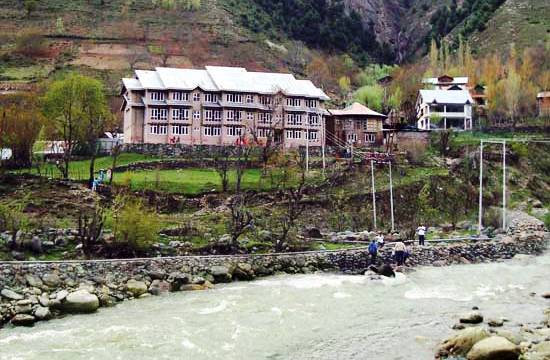
Every morning, for the last eight years, Gul Mohammad Parray, 65, opens the window of his bedroom and feels a sadness overtake him.
The widow opens to the sight of a large hotel in the distance where the permission was only for building a small residential cum guesthouse space. On the other hand Parray, who has applied for a building permission eight years ago for the constructing a house, is waiting endlessly for an official nod.
Parray talks incoherently as he walks around the incomplete plinth of his dream house he laid some eight years ago near his existing shanty like dwelling.
“While we natives suffer in silence, rich and influential people make merry,” he says pointing towards the shinning edifice of Paradise Inn hotel in the distance. “Isn’t law supposed to be same for all?” he asks trying to hide his emotions.
Apart from fighting for his right to decent life including an all-weather house and a proper toilet, Parray hopelessly tries to keep his family from falling apart. “My only son threatens to move away to some better place as he sees no future here,” he complains.
Parray and his family are among many natives of Pahalgam who have been living miserably under a system that obliges the rich and well-connected and seemingly ignores the native population of this picturesque hill resort.
Interestingly, the Pahalgam Development Authority (PDA), which was formed to oversee the developmental work in the region and grant permissions for repair of existing structures as well as construction of new buildings, is at the centre of a controversy.
The PDA helped Town Planning Organization (Kashmir) in drafting a [now] controversial Master Plan 2005-25, which was approved by the Department of Tourism, and formally implemented on August 15, 2006.
Locals blame that the Master Plan deliberately ignored almost all local villages and mentioned them as Green Zones, thus non-permissible for any new construction or even alteration in the existing structures, while green forests like Chanhaji areas are shown as permissible zones for construction.
According to the Master Plan there are three categories: Permissible areas; non permissible areas and Village or an area where one half is kept permissible for construction and another half is kept non-permissible for any kind of construction. “They (Town Planners) seem to lack common sense, how can one half of village falls under green zone while other does not?” asks a villager who wishes anonymity.
The villages inhabited since centuries have been ignored and shown as green zones, thereby, depriving the locals of their right to construct or repair their houses from time to time and to live comfortably.
“We have lived here since centuries and still they (Town Planners) failed to see any population here (Manzimpora village),” said a grand old man, Abdul Ahad Bhat, who claims to be 132 years old.
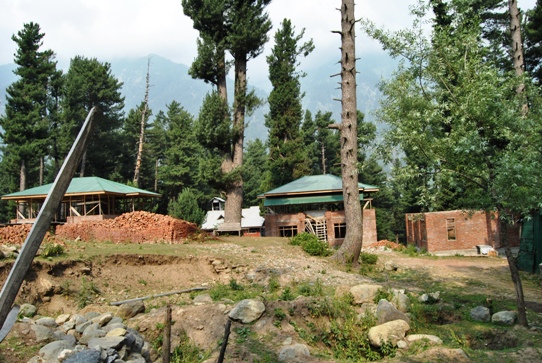
Sensing misgiving on part of the PDA and town planners, the people of Pahalgam under the banner of Pahalgam Peoples Welfare Organization (PPWO), filed a Public Interest Litigation (PIL) in 2008 through Advocate Parvez Imroz in the state High Court in Srinagar.
The petitioners have accused Mir Naseem Ahmad, former Chief Town Planner (Kashmir) and Hamid Ahmad Wani, former Assistant Town Planner (Kashmir) of deliberately committing gross irregularities while drafting the town plan for Pahalgam.
The PIL has made both Mir Naseem and Hamid A Wani respondents in the petition, as they were part of the drafting team of Master Plan Greater Pahalgam 2005-25.
While Mir Naseem has retired from service, Hamid A Wani is serving as a Joint Commissioner Planning Srinagar Municipality.
The PIL blames Mir Naseem for bringing Chanhaji areas under permissible category because he owned a large portion of land there. In view of the allegations raised in the PIL, the High Court on October 2010 ordered the State Vigilance Organization to submit a compliance report.
The VO in its report revealed that the accused Mir Naseem Ahmad, the then Chief Town Planner Kashmir (CTP) has acquired 29 Kanals and 13 Marlas of land at Chanhaji area of Pahalgam in the year 1999, much before the new Master Plan was drafted. He (CTP) fraudulently got the land mutated in the name of his trusted subordinates, Class IV employees Ishtiyaq Ahmad Ganai and Showkat Ahmad Ganai of Kalaroos Kupwara, and one of his relatives Abdul Rashid Wani of Hawal Srinagar by way of oral gift in 1999.
In the previous Master Plan (1980-2005) the Chanhaji area was designated as green forest area, so no construction was allowed there and that land had no commercial value. Mir Naseem had bought the land at a throwaway price of 11,000 rupees per Kanal.
An investigation also revealed that after acquiring the land at Chanhaji, the Town Plan Organization, under the stewardship of the CTP himself, started preparation of a new Master Plan for Pahalgam. A draft Master Plan titled Master Plan Greater Pahalgam – 2025, was prepared in the year 2000.
In order to confirm the concerns raised in the PIL regarding Master Plan 2005-25, the High Court has constituted a six member Expert Committee in May 2011.
The Expert Committee, during its investigation found that the Master Plan suffers from various vital and important lacunae pointing to environmental considerations, violation of Wildlife Act, Forest Act, Ecological and Topographic issues.
The faulty Master Plan has shown Renzpal, Bradhaji and Manizimpor villages in the planning sub-zone A1 – 502, which means no construction or repair of any kind can be undertaken in these protected areas. While parts of Laripora village are kept in the planning sub-zone B1. And, also some parts of Ganishbal village are marked under the planning sub-zone D7.
On the other hand, barely 0.25 kilometres from Renzpal village is Chanhaji area, a lush green virgin piece of inaccessible land, where an area of around 300 kanals are kept permissible for construction by the architects of Master Plan 2005-25.
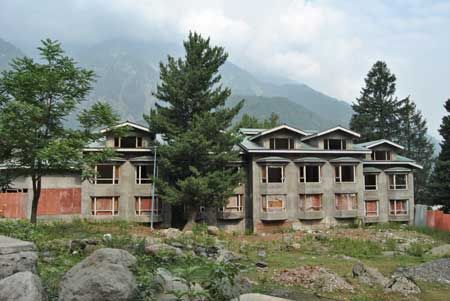
After the on-spot inspection of Chanhaji area the Expert Committee in its report stated that “We the members of Expert Committee strongly oppose setting up of any township or any constructional activity at Chanhaji i.e. Subzone A-14.”
Likewise the petitioners claim that Sub Zone C, which has no local inhabitation and is a dense green forest is kept permissible by Mir Naseem Ahmad as the property is allegedly owned by his brother.
In Sub Zone C, on the Serbal Circuit road amidst the green forest, a large area has been bulldozed to make way for construction of huts. This land with no local inhabitation has been shown as permissible area in the Master Plan 2005-25. The petitioners alleged that the said area has been marked as permissible ‘because most of it has been acquired by Hamid Ahmad Wani, former Assistant Town Planer (Kashmir)’, also an architect of the Master Plan.
In 2003, the copies of the draft plan were made available to the PDA for display of the plan in Pahalgam for inspection of the general public and for receiving objections/suggestions.
The VO, during its investigation raided the office of the Chief Town Planner and seized Master copies of the Draft Master Plan report and the Draft Land Use Plan.
Interestingly, according to the VO, the Draft Master Plan has no mention of the proposal to de-notify the area of Chanhaji Pahalgam for purposes of construction of huts.
About half-a-mile ahead of Chanhaji area is a small village called Bradhaji, housing about 40 odd families. This village is also marked as green zone in the Master Plan, thus non-permissible for any construction or repair work in the existing structures.
Gul Mohammad Khan, 65, who heads a clan of 30 members has applied for permission for construction of houses for his multiplying family in 2001, but was denied by PDA as his land falls under marked green zone.
“Then how they allowed this hotel (Hotel Paristan) to be constructed in the middle of the jungle,” Khan asks pointing towards the 40 bedroom hotel in the distance. “This hotel was actually build by Hamid (former Assistant town planner) and then sold to an outsider,” Khan alleges.
Another green area called Mir Pathery Sub Zone B (near Mandlana village), which is isolated and so far inaccessible by road, is shown as permissible.
“There are gross irregularities in Master Plan, village areas have been shown as green zones with no inhabitations, while actual forest areas where there is no inhabitation whatsoever are shown as villages,” scomplained a resident of the Renzpal village.
According to the PIL, even the Zonal plans have not been framed at the time of drafting the Master Plan, which are mandatory on part of Pahalgam Development Authority.
The master plan shows a large part of the Brenward village, which is situated on the downhill side of Chandanwari Road and comprises around 60 households, as green zone.
However, land on the other side of the road, which is a steep terrain, is mentioned as permissible area in the Master Plan. “They have deliberately kept left side of the road permissible for construction to facilitate the wealthy hoteliers,” said a resident of Brenward.
Mohammad Shaban Bhat, 65, of Brenward has applied for a permission in November 2006 to construct a residential house for his growing family that currently is putting up in a dilapidated cowshed. “In last winter my house was damaged and since then my entire family has to live in our cow shed,” said Bhat.
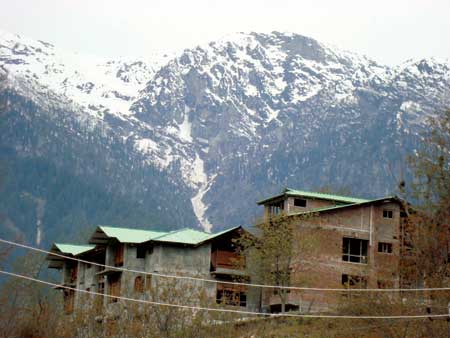
Interestingly, while Shaban Bhat was not allowed to construct his house by the authorities on the grounds that the piece of land, Shaban’s ancestral property falls under non-permissible zone, six new buildings constructed on high slope terrain on the other side of the road, stand tall looking down at the small Brenward village.
According to the residents of Brenward, around 200 fresh permissions were granted in this area prior to filing of the PIL. “They (PDA) gave permission to construct this hotel in 2008,” said Bhat.
“Pahalgam is not only about tourists, it’s about people who have lived there for ages,” said Advocate Parvez Imroz. “Families multiply with time so it is inhuman to deny natives of their right to decent dwelling while commercial construction is allowed in green forests.”
Ghulam Hassan Rahter, 45, along with nine other members of his family lives in a hundred year old wood and mud house constructed by his great grandfather. “I have applied for permission to construct a new house for my family but was denied by PDA saying that our village is in green zone,” said Rahter. “How come all the big hotels are not in green zone when they are located in dense jungles.”
Rather’s house has only three rooms located on the first floor for a ten-member family. Like most other houses in the villages around Pahalgam, the ground floor of Rather’s house is a cattle shed. “We are not even allowed to make temporary sheds for our cattle,” said Rather.
“While influential people are allowed to construct big hotels in forest areas PDA is harassing natives because we filed a PIL to stop daylight loot of Pahalgam,” said Ghulam Nabi Lone, a 70 year old resident of Brenward whose house was also damaged in heavy snowfall last winter.
Similarly, Manzoor Ahmad Rather, who earns his livelihood by renting ponies to tourists, lives in a small two room house with other eleven members of his family near Hotel Maja Palace, a sprawling 40 room hotel, has applied for permission to renovate his damaged house two years back. “Throughout the winters we all dined in a small makeshift tent because construction is banned in this area.”
“I am an illiterate person and do not understand any paperwork. All I know is that I can see big hotels being constructed around us every day while we suffer in the cold,” said Manzoor.
Less than half a mile away, Imtiyaz Ahmad Wagay, 31, lives on rent in his neighbour’s house. His own house was damaged completely in heavy snowfall in January this year. “After snow damaged several houses in our village some government officials visited us and announced compensation and promised necessary help to rebuild our houses. But nothing is done so far,” said Wagay. “They won’t even allow us to repair our damaged houses ourselves,” he added. “Including my old parents, there are ten members in my family. How long can we survive in rented accommodations?” he asks.
The PDA has strictly implemented a ban on construction in green zones notified in the controversial and ‘flawed’ Master Plan 2005-25. A ban sale of construction material in Pahalgam is in place and PDA has set up a check post outside the town limits to check vehicles for any such material.
“It seems that this ban is for locals only. Otherwise, how can one justify the rapid construction of hotels in notified green zones?” asks Mohammad Akbar Wagay, 37, who has covered the windows of his house with polythene as he was not allowed to transport glass through the PDA check post.
“PDA is punishing locals for filing a PIL against fraudulent and defective Master Plan,” says Parvez Imroz.
But in one special case, the locals defied PDA and helped a widow, Rehmti, 65, of Brenward Mohallah to construct a three room single story house after her old mud house was washed away in heavy rains in 2006.
“The entire village came to my help and forcefully got this small house constructed for me and my kids,” said Rehmti. “But when it was time to lay the roof, PDA guys came to my place and threatened me that they will demolish the entire house if I proceeded any further,” said Rehmti. Now, since past six years Rehmti along with her children and grandchildren lives in a house without a roof, no windowpanes and no toilet.
In response to the applications received for repair of damaged dwellings from 65 Below Poverty Line (BPL) families from six different villages of Pahalgam, the Chief Executive Officer, PDA submitted a Status Report for grant of permission to them.
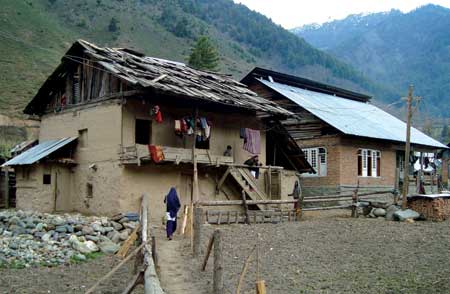
After site inspections, the PDA granted permission to these BPL families for minor repairs. But locals blame the PDA of granting much less material than actually required for even minor repairs like replacing tin sheets damaged by snow or replacing broken window glasses.
The Expert Committee in its report submitted that the residents be allowed to “affect repairs in their houses and afford adequate shelter,” but the locals allege that nothing of the sort happened as the present CEO (PDA) has denied any such permission on the grounds that the High Court has completely banned the construction in Pahalgam in view of the PIL.
“We have already given 200 permissions for minor repairs after spot inspection,” said Mir Altaf, CEO, PDA. “In the garb of minor repairs they (villagers) want to go for major constructions which we cannot allow as the case is sub-judice.”
However, the expert committee in its report observed that, “simply because commercial and developmental pressure exerted by affluent people and the State require more stringent environmental regulations and enforcement cannot shift the burden upon those who have been living an eco-friendly traditional life and subject them to severity and harsh conditions, depriving them of their constitutional guaranteed rights.”
“In order to grant permission for commercial hotels PDA uses excuses like lack of adequate accommodation for tourists in Pahalgam during peak season,” said a member of the of the Pahalgam Peoples Welfare Organization (PPWO).
According to tourism department data, 600 bed capacity is under process for permission to construct. Besides another 1,000 bed capacity is available for tourists by means of a number of private properties, mostly belonging to locals in and around Pahalgam.
Other than this, JKTDC and some private camping agencies has a total tenting capacity of around 4,000 which can be easily exceeded by JKTDC as per the demand.
In total a capacity to accommodate ten thousand tourists at any time already exists at Pahalgam.
In Laripora village, on the slopes of Rajwar plateau, a large section of high slope terrain has been cleared to make space for two major commercials buildings namely Hotel Pine Spring and Laigaroo guest house. The Expert Committee after spot inspection of the sites wrote in its report that, “In order to save the fragile environment of the resort and preserve the ecological equilibrium such practices have to be stopped and stern action taken against persons violating rules and regulations with respect to building permission granted by the authorities.”
However Hotel Pine Spring, which originally had permission for only two small huts (around 20 rooms) is a huge one with 45 rooms.
In the lush green forest adjacent to a famous Golf Course, a multi-building hotel sprawling over a large portion of forestland has been at the centre of controversy, accused for felling more than hundred trees. Acting on complains made by locals the High Court ordered an inquiry.
“Strong chemicals are used by hoteliers to kill the precious pine trees in order to facilitate construction work inside green forests,” said a villager on condition of anonymity.
In order to ascertain the cause of death of around 109 trees within the premises of Hotel Grand Mumtaz, a Divisional Bench of the High Court, requested Vice Chancellor of Sher-e-Kashmir University of Agriculture Sciences and Technology (SKUAST) Kashmir to constitut a Scientific Team of Experts (order dated: 03.09.2011) and file a detailed report.
The technical and highly qualified Team headed by Abdul Rashid Malik, reported that a 122-room hotel is currently running without the consent of the J & K Pollution Control Board. Apart from death of 109 trees within the hotel premises due to non-commissioning of sewage treatment plant and other negligence leads to suffocation of feeder root system. It further stated that the hotel poses an existential threat to surrounding live trees as well.
“Court took a lenient view in regard to the Grand Mumtaz hotel,” feels Parvez Imroz.
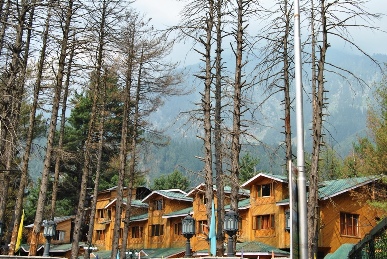
According to the Expert Committee, Royal Hilton Hotel, consisting of 150 rooms has come up in the area, which existed as a green belt (Forest compartment 35) before the designing of present master plan. Further in the premises of Hotel Natraj, in C4 sub zone, five dead standing kail trees were recorded.
“From the environmental perspective, the present Master Plan in its design and operation (practice) does not have any provision of proper disposal system for the entire Pahalgam landscape, thereby making Pahalgam town a clumsy (dirty) city with great healt hazard instead of a health resort,” the Expert Committee report mentions.
It says, one guesthouse, namely Himalaya House, has been constructed on the edge of waterfront of Sheeshnag stream. “One outhouse of this complex has been constructed over the canal leading to traditional Kashmiri rural “aba granta” i.e. watermill, thirdly a portion of the water course has been reclaimed and developed into a large flower garden appurtenant to the guest house complex. Infringement of Water Resources (Management and Regulation Act 2010 Section 83), which reads “no person shall encroach upon, or cause any obstruction to an embankment or slope thereof or the water way of any water source”
Terming the present Master plan as faulty and fraudulent, Parvez Imroz feels that ‘This Master Plan may be quashed,’ immediately.















